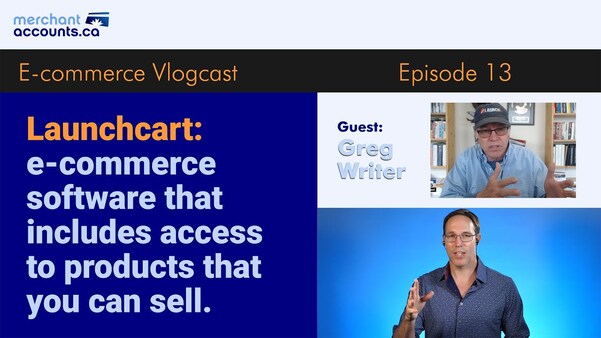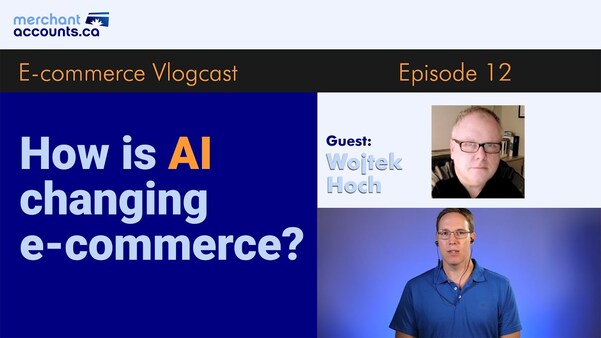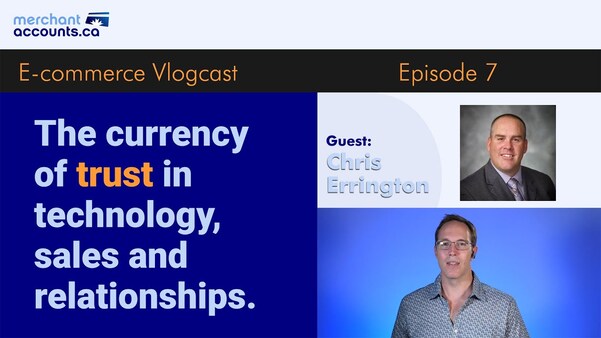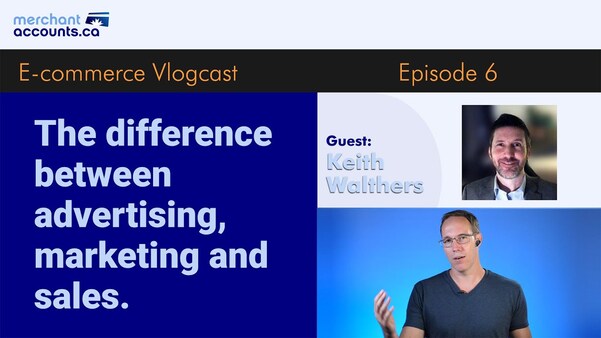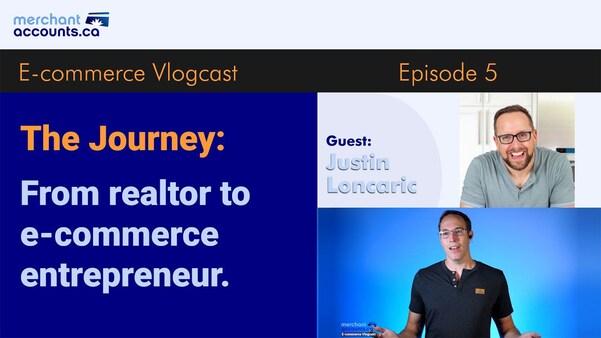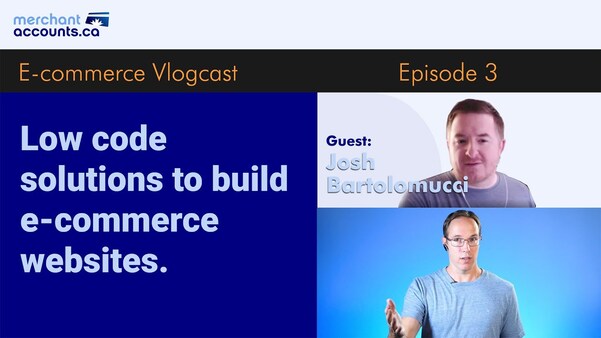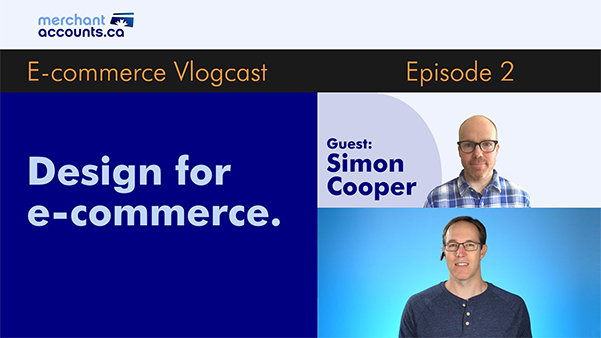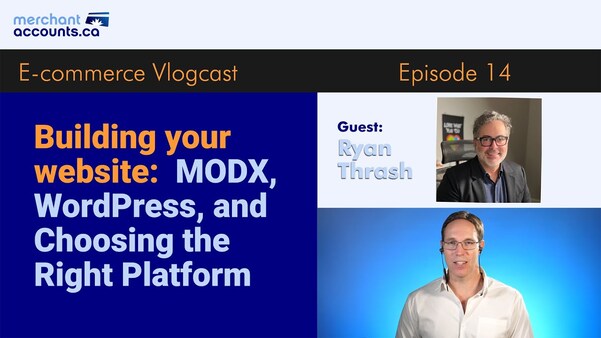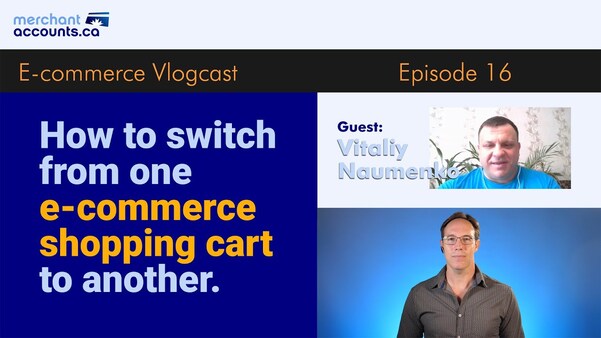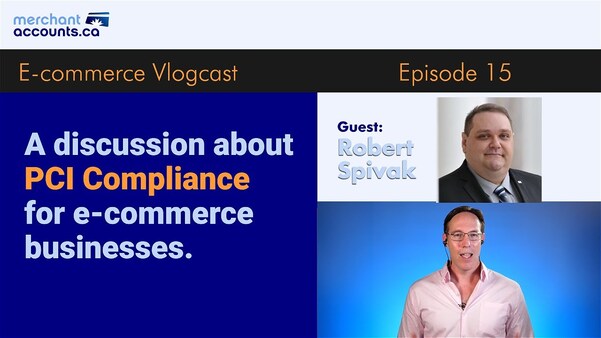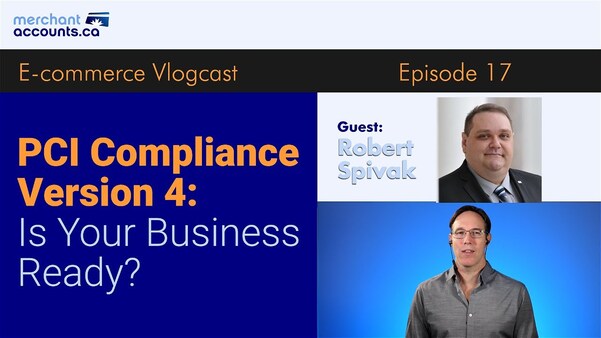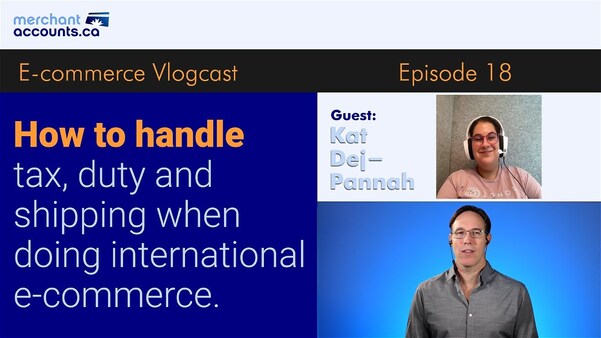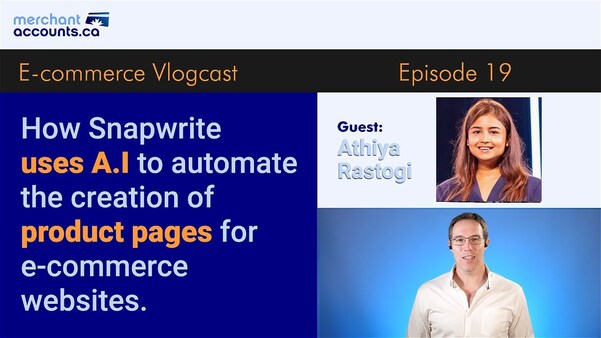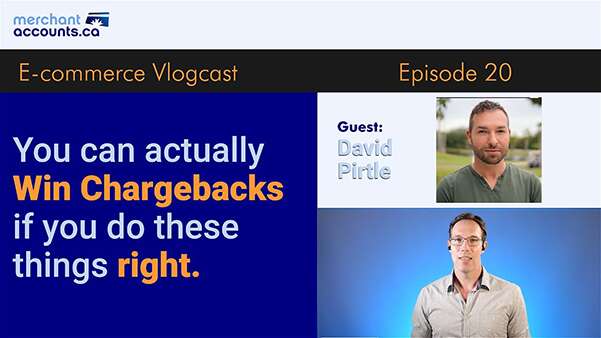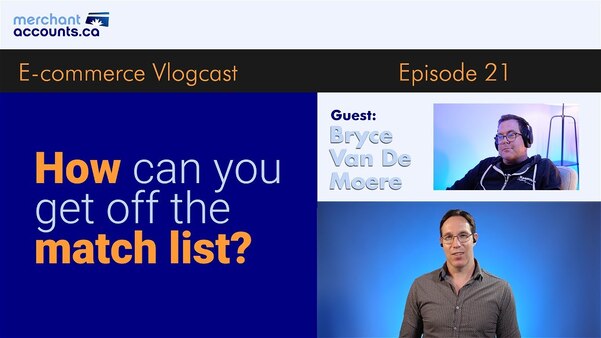Oct 3, 2021
by David Goodale
E-commerce Vlogcast #1: Starting an e-commerce business in 2021
(Slightly edited from video transcript for greater readability)
Key Takeaways
David Goodale:
Hello David, here at Merchant-Accounts.ca with our first Merchant-Accounts.ca payments VlogCast, Vodcast? I don't know what you call it when it's a podcast with a video. But anyways, we're here to talk about navigating e-commerce in 2021. And I have Feargal Harris from Numinix with me today, and we're going to chat about how to go about picking an e-commerce platform. So Feargal, why don't you start by introducing yourself to the viewers and telling them a little bit about your background?
Feargal Harris:
Thanks, David, for the introduction. Yeah, I'm Feargal. I'm e-commerce professional, based here in Vancouver. And my background is in construction when I was younger and a family business learning a lot of aspects of the whole business and then onwards into e-commerce now where I've done my masters in e-commerce, I've found out a lot about the industry as a whole and where the different aspects of the business side fit into the technical parts around e-commerce. And now I'm working for two or three companies in Vancouver here sharing a full service e-commerce experience with web development design, digital marketing, and a little bit of an e-commerce platform itself. That's a bit about me.
David Goodale:
Perfect. And that's one of the reasons I wanted to have you as my first guest. Because you have quite a diverse, like you touch a lot of stuff, you know, marketing and SEO, but also I know Numinix works on a lot of e-commerce platform. What are some of the most popular platforms these days?
Feargal Harris:
Hmm, yeah. Well, obviously, if you know anything about e-commerce, you've probably heard of Shopify, it's been the lowest barrier to entry to the industry. People can go there, they can put in their credit card details, buy a domain, and upload an image, upload a price, upload a weight, and then start selling their product online no matter what it is. So that's been incredibly popular for people trying to get into e-commerce of late. We also have WooCommerce, which is built on top of the WordPress platform, which is traditionally a blogging platform. But WooCommerce is a cart plugin that turns it into an e-commerce platform.
David Goodale:
Now I was told because I reached out to WooCommerce last year, that by installations, it's the most popular shopping cart platform on Earth. Do you think that's accurate? Like by installs or by merchants running it?
Feargal Harris:
It was last year or prior to 2020, for sure. And most of 2020, and then the WooCommerce definitely had the biggest chunk of the market for sure. Then Shopify started, kind of chipping away at that. And you'd look at the different sides of businesses, obviously, you have platforms like e-commerce, or Magento, who would go after enterprise level, they may do more in revenue, then as shop kind of a platform like WooCommerce, WooCommerce would have a lot more merchants that are smaller ticket.
David Goodale:
Because it's free, because there's no barrier to entry at all other than you got to get it working.
Feargal Harris:
Exactly. You look at I've mentioned Zencart and I've mentioned Shopify there on both ends of the spectrum. And Zencart is fully open source where Shopify is a hosted platform, you don't really need to know web development to get on it. And then the rest of them are kind of dotted in between, if you have kind of had a matrix, you'd have WooCommerce, somewhere in the middle Shopify and one end [Inaudible] and big commerce Magento just kind of dabbled around, they offer you open API's, or you can install it on your own server, or you can have kind of as much hosted as you want.
David Goodale:
Exactly Feargal, I think you just kind of uh, we just kind of stumbled into the whole point of this topic that we're tackling in our first discussion here, because it's really about choosing platforms. And like that's all the way back. I'm not even talking currently. A zillion years ago, a zillion e-commerce years. I guess a zillion in e-commerce years is like 15 years or more. But so back in the day, it would be like, do I go with something that I pay for? Or do I go with something open source, I guess, or do I build it myself? And so maybe I'm gonna kind of start there. So let's think about a typical basic e-commerce merchant. I'm not talking about Sony or you know, some huge merchant. If you're starting an e-commerce project, you're either an established smaller business making your foray into e-commerce or you're a pure startup. Then is picking the cart, can any cart get you going decently or is researching and picking the right cart, even important in what you'd call version one of your business when you know that you have growth in front of you?
Feargal Harris:
That's exactly it. David, like you hit the nail on the head. Do you know what your growth is going to be like? Do you have done your research or are you starting up a business from scratch with a product that you like and you're passionate about. And let's say you're a small merchant that already has a brick and mortar store, you have a following, you could confidently say, Okay, I'll put my products online and reach out to my existing customers. You can do very smart things, as you know, with the payment terminals at the till, and start collecting people's email addresses. And then you can then email your customers that have already purchased for you and direct them to a new website that you've just built. Therefore, kind of touching the more points or getting more touch points with your customers for sales. What kind of business would you have in mind if you were starting from scratch? And maybe we can take an example.
David Goodale:
Oh, wow. A widget store? Okay, let me come up with something good. I'll tell you what I'm into, this is just a personal thing. I am totally into all these electric mobility devices. So I have a one wheel, for anybody that doesn't know it's like an electric skateboard. I also have an electric unicycle, which is just a more powerful version of a one wheel. I also have an electric hydrofoil, which is about the world's coolest thing. It's an electric surfboard that flies on a hydrofoil over the water. Like if I was a kid, yeah, if I was a kid, these all would have cost a million dollars, it would run for 4 minutes, and it would have weighed 400 pounds. Like that's how far in the future I feel we're living sometimes. So let's say that I'm doing a high ticket product because this stuff isn't cheap. It's niche. The shipping is a problem for sure because you can't ship the batteries on a plane. So there's going to be I'm just throwing, I'm just making stuff up for you. And because it's so high ticket. You want to be careful about fraud, you want to be validating your orders or scrubbing it. Now I'm thinking like a payments guy. There's a lot of other stuff to think about, too, that I probably don't touch or interact with day to day, such as managing your inventory. So I think that's enough. Why don't you run with that. And I'm curious to see what you come up with here.
Feargal Harris:
So it sounds like you want a niche electronics store. Like, you'll see a lot of big electronic store popping up where they have a Shopify, and they may have a drop shipper. And they connect the drop shipping software to their Shopify store, and they're away. And they're doing that and so is everybody else and their dog.
David Goodale:
It's like a commodity business where you're trying to make a couple pennies. I've never been good at that. I don't understand that business model. And to be honest, I personally wouldn't ever want to do it. So let's go in the in the niche direction.
Feargal Harris:
Yeah, it's perfect, you kind of have an issue have a sporting electronic goods store, for people that are passionate about not just maybe surfing, cycling, bicycling, skateboarding, unicycles, you have it all there. And so you build your brand around that. And you would likely want to differentiate yourself because of that. So let's say you did want to get on Shopify, because your startup costs are going to be quite low, you want to save some money for inventory, because as I said, it's high ticket items. So unless you have a massive budget, you're not going to build a massive website with all the bells and whistles that you won't need for five years, and also have a warehouse full of stuff that you haven't got any marketing budget is up. So you want to be depending on what kind of budget you have. Let's just say a small budget is $1,000.
David Goodale:
Wait, what's that $1,000 for because that's a tiny budget. I mean, I like respecting budgets. You know, I remember being a startup every dollar matters. So I don't want to be dismissive, but I want to be clear, is that $1,000 for the whole website? Because that seems like-
Feargal Harris:
What say you have $10,000 a month to run the business.
David Goodale:
10 a month, okay. Or, anyways, let's run with that. Because that's a serious business, because that's $120,000 a year. That's more than a lot of startups. But it's also this is a real business. Okay, sure. Let's run with that. That's good.
Feargal Harris:
Let's say you have $5,000 to $10,000 a month to start this business. And that's as a result of having a full time job. I'm working hard. I'm maybe getting some family and friends involved to help you realize your dream. So off the bat, a good website can cost you over $10,000. So right away, you don't want your first three or four months budget blown on the website.
David Goodale:
And you're talking if it was custom designed, graphic designer coded and in the marketers and the SEO and the copywriter. So you're saying like don't spend all of your money on the first five minutes of the job here basically.
Feargal Harris:
So when we have a good budget, we would be starting from scratch. You have to start with the logo. You make sure that our company has a good catchy well designed logo that people will notice. And then from that logo designers can pull the obviously the color palette the rest of the design the flow of the site to a kind of inspiration journey back. A designer would go on and a lot of people on the front end and InDesign will understand that. And then when a designer has that, and the way we operate is we have our software that the designer designs in his software, and then that software has all the coding for the front end, such as the pixels, the hex codes, the front end developer can take them and turn them into a website. So because we use that software, you're going see your design before it's actually undergone any development to see exactly how it's gonna look. And then the back end developers come in and make any features work that need to interact with the backend.
David Goodale:
Now, you're talking about back end, just so because I want to run I love this example. In fact, that was a great advice about come up with the logo, because that is your color scheme. And I also there's so many things I want to talk about because you back in the day with e-commerce, it was like, Is it safe to buy online? I mean, nobody talks about that anymore. Because everybody knows it is. I mean, maybe if you deal with really elderly people or people that wear tinfoil hats or something, I don't know. But in reality, nobody challenges that, but you still have a trust issue. If your website doesn't look credible, people have a fear of purchasing. And so getting the logo right, the color scheme right, the design, right, I very much agree with you very important. But then you segwayed into the coding, the development, the back end, are you talking in this scenario? Are you custom building a website? Are we talking about a platform? Where we going with the you got the design you got, okay, let's say you got a PDF file or Photoshop, a PSD file, where do you go now?
Feargal Harris:
So the PSD file is the same as the software that we use, except it's the software's is more integrated, easier to use, easier to share, all hosted. So you got a PSD file, or we use that software. And then front end developer comes in and uses the front end code. And so you've HTML, CSS, JavaScript, all of these front end codes that developers can use to make a good website. A lot of vendors build for [Inaudible] talking about Shopify here, we can't do any back end, we can use plugins or we can build them. The front end code, however, is specific to Shopify, they have their own language called liquid, where you learn how to build a different things in their language. So a developer will build that on Shopify for you.
David Goodale:
So in this example, is Shopify the platform because that's where I was getting lost, because I have a design. And then you kept talking about the software and the platform, but I'm not clear. I know Photoshop, but you said we're not using Photoshop.
Feargal Harris:
I'm trying to walk through the process where if we had the larger budget when we clearly don't. So because of the lower budget, we would pick a hosted platform like Shopify, you can also do this on WordPress, and still have a similar experience. But you'd still need a development budget every month, we're not quite there yet. So Shopify can start at $39 a month, where, if you want to have a wet year startup, you don't have much money in the budget for a developer on staff. So you'd likely outsource to a company, such as Numinix, who will charge at a minimum $400 a month for two to three hours of development work. And if something breaks, then that budget could be double, won't break on Shopify, my break on WooCommerce most likely will break on Zencart. So again, you're going back to your matrix of where you are. So it's risk versus reward if you take a risk on more open source platform.
Feargal Harris:
And the reason I'm saying this is because you've brought up a good example for shipping. Now you can't ship them on airplanes. So there's a shipping rule that needs to be created to prevent next day air delivery, if that's a service, you can turn it off. But there might also be other restrictions that you might need to add to your shipping rules. So I do have an example of damage. I do think that you'll understand this one so we had a client that was on Zencart move to Shopify, very successful furniture store in the US, and they sell furniture, with furniture comes nightmare for shipping. And so they have a customizable sofa let's say, you can buy it in a two seater loveseat and a three seater with a chaise lounge. And that can be shipped in, let's say Montana for $100. It can be shipped down to Florida for $350. It varies with all the different shippers, all the different services, whatever else is in the customer's card, and all these shipping options need to be configured. They can mostly be configured in Shopify. However, when you make all your choices as a customer, so you choose the shape along with a three seater, Shopify doesn't create that product until after you add it to your cart to the product doesn't exist until you create it. And then Shopify is back and creates a product added to your cart.
David Goodale:
Oh, because it was like made up of a bunch of parts or options, you're almost cost of assembling it. Okay.
Feargal Harris:
Right, so you're with me there. So you've just created a new product with no admin help. The only thing you have to go on is it's in a category. And that category has a default shipping option. Now, this sofa might not match the default shipping option, that everything else matches. So you'd have a shipping rule for that. So if you buy this sofa, whatever customization and the products there might have its own custom real, don't ship to Florida, or charge extra for Florida, put something else in that category might not need that. However, when you create the new product, it doesn't know which one to take on as its default shipping option. Because it's created a card, there's no human intervention to say, Oh, this should be this option.
David Goodale:
May I come in with a question there Feargal, because this is fascinating to me. And I'm, I can't be the only one thinking this. So this is something that you arrive that because clearly there was a problem and you've analyzed it, you understand the problem, and you found the solution. So I'm going to ask a very simple question. In most e-commerce platforms you'd have a couch, which would be a product and then you'd have an option like chaise lounge on the left hand side or on the right hand side. But you're not doing it that way. You're not doing one product with a bunch of options, you're assembling options into a skew or a product. Why was that the approach? What was the problem that caused you to take that approach? What did it solve?
Feargal Harris:
So this is always how it works when the customer is on Zencart, it was never a problem before. It's a great experience for the customer to be able to choose their sofa. And I believe Zencart probably had a product or a skew option for each outcome. And it was never an issue. But when you move to Shopify, Shopify doesn't operate like that, you have to work within what Shopify gives you. So that's why this caused a problem and there is a solution. And it's just more expensive than having just stayed on Zencart improving it better than Shopify can be so you always have to take the good with the bad, and this customer also has a point of sale, which is good. Shopify has their own point of sale. One of the things I'd always say is that you probably shouldn't go with a point of sale that gives you an e-commerce platform and you shouldn't go on an e-commerce platform that gives you a point of sale. You should find the best e-commerce platform and the best point of sale and then integrate them.
David Goodale:
I totally agree. It's like but you can apply that even broader. We can apply that to e-commerce software. You don't pick the e-commerce software with the most features, you pick the one that's best at selling what you've got to sell. Let me just explain that in an even more specific example. Because otherwise it's like hey, you can find one that includes web hosting, and you're going to find one that includes a maid service and they'll you know do your laundry every three days but one's got nothing to do with the other, so why don't you just get what's actually best at what you're trying to solve?
Feargal Harris:
Yeah, nobody knows everything.
David Goodale:
I know nothing so we balance each other, there we go.
Feargal Harris:
Oh no, it is very difficult and it's about having the foresight to know that if I go with this, is it going to keep me restricted in the future? Or should I go with this now, and it opens up my options when eventually this may happen or may not, and will it get you there in the short term or kind of afford it? So what I'm doing here is bouncing between Shopify is completely closed off and Zencart is completely open. Maybe somewhere is what we're doing is landing in the middle, like WooCommerce.
David Goodale:
Right? Right. So yeah, there's so much there's so much to go over here. One of the things that I want to ask is okay, so you've really picked Shopify as your kind of the example and there's lots of them for a hosted cart platform. Another one could be big commerce. Another one could be 3d cart. Another one could be bla bla bla bla bla. Here's one for you, I'm going to have to just ask what I think is an interesting question. What are your five favorite e-commerce platforms? I'm not even qualifying it. It could be hosted. It could be this, could be that, what are your five favorite ones that you always consider using.
Feargal Harris:
Okay, well, I'll give you four.
David Goodale:
Okay, four works.
Feargal Harris:
And so WooCommerce is definitely up there.
David Goodale:
Okay, is that because it's so open?
Feargal Harris:
Yeah, it's so open, it gives you, you can customize every part of it. And it does have a core team working on WooCommerce. And they, it's best for you not to customize their core code so that when they do provide updates for security and for new features that you can get them not override your code or have to do a lot of merging, like their new code with your new code, because you customize it. But it's also got 1000s upon 1000s of developers creating plugins for the platform. So the features are there, they might cost $100 a year, which is very little compared to, you've already paid that just to be on Shopify, you might be paying more if you're getting big enough to have all these new features. And so WooCommerce is really right in the middle of open book, it's got an element of support for just from the free plugins, and everybody's WooCommerce work is free. But they charge a premium for a lot of extras that a lot of people will pay. That's how they're supported. So it's a very good way to get your feet wet. And then after WooCommerce, you would look at something like to me my train of thought goes you're growing now. So you looked at something like big commerce, Woo is a more stable hosted platform with an open API, which is basically a set of features that allows you to connect to most parts of their system, where Shopify is API is quite closed off. Big Commerce has 91% open API, so you can build pretty much what you want, except for a few 9% of their platform.
David Goodale:
I have to ask a question around that. Because, you know, so my approach in life is not often not the right approach. I mean, we're all human, right? But I really like not being painted into a corner. In fact, I still have the tendency to want to custom code everything, which is a nightmare, because you can like it's so much more unnecessary work, but at the same time, it can be good in some situations. But anyways, so the idea of being on Shopify, which I know is restrictive, is a challenge. And if big commerce is open, or very reasonably open, to me, the word that just pops in my mind is like, I want to ask Feargal: if big commerce is better? And I know that that is not really a correct question to ask, because it's a broad question. There's so many things to consider. But by and large, if one's open and one's not, isn't the open one, broadly speaking better, because even if it's maybe not as fast, or let me just make a simple example, maybe it's a little harder to upload a product or something like that. But is it not a better investment for your business that you won't be painted into a corner, that's where my mind goes, I'd love to know what you think about that.
Feargal Harris:
From my experience, big commerce, it does run into some of the same issues as a shop for those where you grow to a certain point, something is not standard from your business, not out of the box, and it's kind of hard to build. It's not supported by big commerce, and then you do end up having to invest heavily in your own dev team, or a third party to build that for you. And if it's not there, you'll have to pay for it. Basically, it's the same for both platforms. With Shopify, it's hard to say you could end up paying $25 a month per plugin for pretend logins to an extra 250 a month on top of whatever they're charging you just to have 10 extra features that should be standard or could be standard in another platform. So the best practice to do is to actually list out all the features you require now, what you might require in the medium term, and what you might require in the long term, and try and match the best platform based on that, because it could completely vary by business.
David Goodale:
Okay, well, that totally makes sense. And I hijacked my own question there. You've given me 2, you promised me 4. We got WooCommerce, we got big commerce. What's the next blank commerce.
Feargal Harris:
After that, I like the Opencart ones, I do the open source ones like Opencart and Zencart. However, it's very difficult for the industry now because I feel that the industry is moving a lot more towards really slick, cool front end developers and having a hosted platform or a headless e-commerce platform below you so you can build on top of it. I'm moving away from the open source, back end customization. And just because of how prominent that they all are in the industry. So it's hard to stick with the A will always will always stick with the open source and will always support it as long as we can. But it's hard to put them up there with the rest of the platforms that are really pulling out all the stops. Like if you look at, if you look at SAP, SAP claim that they have an e-commerce platform that there is more volume in sales volume than Shopify, Amazon.
David Goodale:
You know, but is that even a fair point? Because as, my friend is an SAP consultant. It's a huge old platform. So the companies that are on it are going to be huge, old businesses. Well, if you're huge and you're old, that means you do a lot of sales, you know, like Kellogg's, I don't know that they're on SAP, but companies around like it's going to do a lot of volume. Isn't that a skewed point to their-
Feargal Harris:
Absolutely. And they want to charge $2,000 a month for a headless platform that you build on top for the privilege of saying that. So yeah, it's probably more and marketing, but the-commerce is there, the sales are there.
David Goodale:
And so it's capable.
Feargal Harris:
Yeah, yeah, absolutely. And but for me, the third one is coming back to me now, because I'd have to say Zencart, just because of how much it's taught me personally, how customizable it is, like I know more about e-commerce than I would if I was dealing with Shopify everyday just because I have clients on Zencart, when they come to me with a question, because that's my role, I need to answer the questions I have and find them new features and grow their business. But when they come to me on a question for with a question on Zencart, immediately, my thought goes to okay, how can we do this. Where if they come to me on Shopify, when a question is like, well, let's look at what plugins are there first, then we can discuss the budget of what we need to do if no plugins there, or if we can even do that. [Inaudible] there for that. WooCommerce is the same. But as anchored is just, it's still going strong, I still get to talk to people every week that have just started in the e-commerce and they downloaded and installed Zencart and they want to, they really like how it works, even though it looks like it's from the 1990s because it is but these people still like it. It's gives you a sense of freedom, you can do as much as you want or as little as you want, and it's still a cart, it still will allow you to check out and it still has templates and themes that you can install and upload products.
David Goodale:
Is Zencart not an offshoot or derivative of OS commerce?
Feargal Harris:
I think that could be before my time.
David Goodale:
Yeah, I think that because OS commerce was open source. And I think someone modified it and created Zencart. But I could be totally wrong. But I have to ask a question. I'm going back to something. You've used the term twice or three times in this conversation. I've heard this term, people have explained it to me before, but I have not absorbed it. What is headless e-commerce?
Feargal Harris:
Okay. Headless e-commerce is basically your back end system. So we've spoken about the front end and the back end. And it's kind of like how Shopify works to where they don't give you access to the backend. But it is a full e-commerce platform minus the catalog side that the customer sees. So you don't have a theme, you don't have products you don't have anything really, other than anything on the front end, you don't have text or anything, you got to build all that yourself and integrate that with the headless platform that's been provided.
David Goodale:
It's a custom front end hooked on to it's like this, I don't want to build a-
Feargal Harris:
It could be back end, you could build it and also it is what you make of it.
David Goodale:
And here's a good point to typical viewer. If you're a smaller midsize business, you're trying to pick out an e-commerce shopping cart platform. I've been doing e-commerce and payments for 20 years Feargal has been doing it forever too. All he does is work on platforms and the two of us are like, we're not exactly clear what headless e-commerce is. So if you're confused, don't feel bad. E-commerce is a complicated topic and nobody knows everything. So I love the idea of coming back to that on a future episode. Let's talk about what I was talking about what cards but forget about what carts for a second. Are there any features that cart should have that a lot of business owners don't consider? So you might frequently get requests from people who ask for something or maybe you have clients and you're trying to give them advice you really should think about this. Like I'll give an example that's probably wrong. You really should think about something that automates the creation of your shipping labels so you don't have to spend so much time shipping stuff or something but I'll get kick that over to you. What features do you think are really important, but ovelooked.
Feargal Harris:
I mean, that's a great one. And then I know we've really segwayed away from our budget and our business idea
David Goodale:
I actually forgot about, that's terrible, isn't it? Oh my gosh, we're all over the map-
Feargal Harris:
I'll kind of tie that in now. You'll have your features that will be good for your business processes, like the labels, you don't have to go and print your own labels, it'll save you time. And then you'll also have features that might improve sales. So an ops is something that if you only had the budget for one feature, and you're choosing between that, and abandoned cart plug in so that if somebody leaves your cart, put their email address, and you can send them a 10% discount to come back and check out about making more money to save time with the labels.
David Goodale:
You're talking about the abandoned shopping carts here. Convert your, you got traffic that wasn't a sale. Let's get them back.
Feargal Harris:
Yeah. So like 70% of users abandon at the checkout. Don't actually check out.
David Goodale:
Is that oh, wow, I didn't know that. That was a statistic? And I'll bet you that would be dependent, obviously, on your category and your industry that you're in. But that is a really interesting statistic.
Feargal Harris:
E-commerce average. I think you look at Shopify, that's a really easy one to kind of talk about Shopify has that integrated into their platform.
David Goodale:
Well, because they have all the data because it's a hosted platform. Hey Feargal, so listen, I like this thing about starting with coming back to my very cool electric toys business, which by the way, makes me sound far cooler, and far more coordinated than I actually am. I'm not a good surfer or anything like that. In fact, the reason I have an electric hydrofoil is because I realized that surfing in the real world is just sore shoulders, I don't have the shoulders for it. It's so much work. So let's go back to launching this business. So we started, I got a logo designed, I got a graphic designer to come up with a color scheme designed the fonts, then you said pick the platform, something like Shopify, maybe instead it's a WooCommerce. So I'm going to be the merchant in this role. Okay, so let's roleplay this, I don't like the idea of being locked into Shopify, because I don't like restrictions, good choice or bad choice. I don't know what that is. So I like more of the and I don't want to go with Zencart, it's a little too old.
David Goodale:
And honestly, WooCommerce makes me a little nervous too. So here's the thing. And I think this is a headless e-commerce. I'll tell you what I like, I like shopping carts, where it's like I don't want to code an Add to Cart button, because that's been done 10,000 times. And I don't want to do the session tracking or whatever. And I don't want to do the tax logic. And I don't want to do the shipping logic, I want a library that I can leverage. So that I can I can take my design, put it on a website. So I'm going to hire a designer maybe to custom code, the homepage, let's just do a homepage, a product page and really looks like the about page the privacy page the Contact Us page those are all copies or derivatives of the home page that's mostly recyclable.
David Goodale:
If you're with me here then I'm going to take the product page and I want to populate in the Add to Cart button I am going to insert my own imagery so I'm not going to call a database for the image the image is going to be on my server but when the customer hits Add To Cart everything subsequent in the checkout flow is now running on the e-commerce platform. That's my preference so I know some carts like that are Spree Foxycart and a bunch that I can't remember the name of but are you familiar with any carts like that and if I told you that was my preference, you could even correct me, I'm curious to know what your advice would be to me on my $5,000 to $10,000 a month to spend. What are your thoughts based on what I'm giving you to work with your, for my electronic toys business?
Feargal Harris:
Yeah, so it sounds like the more the more you think the more money you're gonna spend so you just want to be careful there like cost out the options like Shopify is the cheapest option but it could be expensive in the long run for you and hard to get away from. It's a big expense to move and to redesign again, but that might not be a major problem if you don't invest as much of it as much in it at the beginning. So you'd weigh that against if you wanted to start stable and then and then move on when you have a bigger budget. The headless e-commerce just to touch on that, you still need to build the cart as far as I'm aware for the most ones that I've seen out there that we work with you still have to build the cart side of it as well as the product pages.
David Goodale:
Is it not a library though, where you know, I'll give you an example. I'll give you a great example. This may not be headless e-commerce, but so I have a rental property and I use a software platform called Owner Reservation, or OwnerRez, free plug to them. And the reason they use their platform is I was going to build my own calendar. And like I'm actually not good enough. But in my mind, I'm good enough. Yeah, 21 years ago, I was a coder, no problem, I can pick this up. I started working on it. I was like, Why? Why would I do this? Even forget for the fact that I'm a slow, poor coder and just tinkering on this as like a hobby project. Take that out of it. Why would I even as an advanced coder, build a calendar that tracks availability, when that's already been done. So when I started looking at platforms, and I had the website, I had my design and the write up of the vacation property and photos, distance to the beach, all that type of stuff.
David Goodale:
And I was able to take their calendar widget, drop the calendar widget in. And when you clicked on your dates, right in the widget, it's like Click Here to proceed with your order. And it connected to my merchant account, our merchant account for Merchant-Accounts.ca. The payment gateway that I was using for that is PSiGate. And so I was basically able to take their stuff and drop it into my custom website is so when you say you have to build the cart, is because I had to incorporate the widget, I had to customize it. I had to, you know, include the JavaScript files and whatever else you need to do. Is that what you see when you work on those type of platforms are? Because if you're building the Add to Cart button to what exactly is headless nothing. What is the headless part powering?
Feargal Harris:
Yeah, this is something that definitely I'd need to research for to come back into it. Essentially, the headless e-commerce platform will take the transactions, take the data, and stored in a database for you. And then give it back to you when you need to use it for okay, the act of building you will still have to build the cart, whereas a hosted platform like Shopify, big commerce, they give you the cart. That's why you go to hosted platform, if you want more than a hosted platform that is unique. It's a headless e-commerce platform. But a lot of these hosted platforms are actually headless e-commerce platform with an e-commerce platform on top.
David Goodale:
Okay, so one of the things I'm curious about is are most shopping carts bloated these days? I'll tell you why I'm asking that question. I used to commit to do to a shopping cart reviews. Like I've reviewed Shopify and big commerce over the years, most of these companies I used to do writing for is to write for Shopify payments area of their website and stuff like that. And so I would interact with them, right. And the point that I'm making is, if I had committed to them, hey, I want to review your cart for a website, it'd be it was always more work than you'd think. But it was always the similar stuff. Does the shipping logic work? How tough is it? You know, and what are these other interesting features? But now like, I can't commit to that anymore? The programs are too big. Is it bloat? Or is it? I guess what I'm asking is are shopping carts bloated? Did they try to do everything? Do they try to do too much? Or are there some carts that are lean? And they do what you need to do? And they make it easy to add on? Only what you need? If that question makes any sense.
Feargal Harris:
So yes, no, and maybe are all the answers to your question, so that you would look at them, a large company that needs a lot of features. If an e-commerce platform is trying to cater to them, then they might have a lot of features in their cart that not a lot of people need because they're specific to certain industries. So there could be bloat there, where you look at a large company like that might build their own custom e-commerce website. And that's how they keep their checkout clean. And then on the opposite end, where you have a hosted platform with a checkout that you can't customize like Shopify is on their basic plan. Those are the basics with not a lot of bells and whistles. And that's there for conversion optimization. So they put a lot of resources into making sure your card can convert but then as you grow that basic card that converts well, doesn't offer you the opportunity to customize it as much as you could, elsewhere.
Feargal Harris:
And then I want to I do want to continue on to WooCommerce where WooCommerce is all of that it's trying to cater to everybody is trying to be best shopping cart experience it can be it can end up being a lot of bloat. When you get a certain amount of people on the platform and fan your website slows down and there is no fix. There is no getting away from it. WooCommerce will slow down after 1200 people at a time on your site, and then you have to start putting them in a queue to get onto your website. So your website doesn't break due to too many processes.
David Goodale:
Right. Interesting. So actually, your audience also plays a role performance. What a good problem to have. You have too many customers. It's killing your-
Feargal Harris:
Yeah, I would not say you have a budget to say, Well, I build my own e-commerce platform, forget the rest of them, which that won't happen to Shopify. But it'll be very hard for you to get onto Shopify to get that traffic on Shopify, like one of my clients who went to all the platforms with their large client. They asked me how come Kendall Jenner is on Shopify? And the answer is simple as Shopify can handle the traffic that she will offer and she'll be on the top plan they have. But she doesn't need SEO. She doesn't need ads. She doesn't need really much marketing, because she sends out one tweet. And the whole world stops and looks. So for us to get to that stage, you have a WordPress, WooCommerce WordPress blog that will get you way more traffic because it's set up as a blog, way more organic traffic, which is the holy grail, a Shopify award where your blogging and your SEO meta titles, metadata is pretty much the same as everybody else's if you install the right plugins.
David Goodale:
It's one of the reasons that I love custom. Because my background, I mean, a zillion years ago, was in online marketing and SEO, and I'm militant in my approach. The way that I describe SEO is to picture people scratching their way across a battlefield. If you can get this much further than the guy next to you, you're higher in the ranking than them. I know, it's not literally correct. But that is my approach to SEO because nobody knows the algorithm. And now see, now I'm off on another tangent, but nobody knows the algorithm. And it truly is a battle to be as relevant as you can and have the most useful content. And I don't believe in blackhat SEO, to our viewers who don't know what that means. There's like sketchy things you can do like trying to stuff keywords on the page. And I don't believe in that. I just try and do it properly.
Feargal Harris:
It's not good. We do SEO for our clients. And that's the one thing we try and make very apparent is that we don't believe in blackhat measures. We have a lot of clients that are arguing with us. Why won't we do this? And why would you do that? And they go off and do it themselves. They say my traffic's dropped what happened? Well, Google just released an update. You caught you doing what you're doing. Yeah. And I'm like, they're nice people. They're just maybe misinformed or it worked at that time. And then they come back to us and we fix it. Whats better in the long run. It's not the right thing to do. And you can lose your traffic overnight, and you can lose your business. Because you wanted to make a quick buck here or there. So no, I don't agree with that. And go back to what you're saying. Like on the battlefield. When you're right. It's a battle to get above the next guy. And if you can imagine you're the guy you're battling with is on Shopify, they only have so many tools. And then the rest of their tools are not affordable or not built yet. Where you're on an open source platform, and you have all the tools that you want, or can build.
David Goodale:
Because you're not stuck. You're not boxed in.
Feargal Harris:
That's right.
David Goodale:
Exactly. Well, let's talk about custom for a second that because we haven't gone here, and I do believe there is a place for totally raw custom e-commerce websites, maybe-
Feargal Harris:
Headless comes in. The headless comes in when you want to do completely custom, where you don't have to worry about processing side of it, or the server side of things.
David Goodale:
So have you ever had a client that you were shocked at how successful they were? And it was something to do with the platform like, either they asked for something or you recommended something, and it just worked out? So well, like there was an obvious tangible result, because of the decision that was made.
Feargal Harris:
It's hard to say yes, because I put a lot of research into the recommendations that I give to my clients. So when we do something, I do have the expectation that will work because it's based on the research that I've done. The one thing that I always see, and it's just vindicates everything when somebody moves to a hosted platform or disregard for SEO. And then you look at their analytics and you see exactly what happens they see a list maybe a small jump in sales or sales say the same and they move platform everything's great Okay, now I'm on this new platform. I can do more with limited admin knowledge because I can I can install plugins myself, and what Right beside. So what I see is that they see, let's say $100,000 a month across the board for the last six months, three months or one platform three months with a new platform. I see their conversion rates skyrocketing because they were on an open source platform, and they haven't really invested in design. And that's why they're going to host a platform like Shopify. So the conversion rate sometimes doubles. And their organic traffic goes in half or less. And I'm saying, well, that's exactly what happened, you updated your design perfect. That's what happens when you update your design, you do it for conversion optimization, but you lost SEO traffic, imagine you had a stayed on the same platform and updated your design there. You'd have doubled your sales.
David Goodale:
Yeah. Sounds like here is big-
Feargal Harris:
I said it to everybody beforehand. And then they don't believe me until it happens afterwards. And I can see the I see the analytics, I'm looking at lines going like this. Yeah, or that way, I don't know which way your camera is. And then I'm also looking at conversion rates going up by 100%.
David Goodale:
So Feargal, I can tell that SEO is super important to you. And it is absolutely super important to me, it's one of the most important things to our business. And I'm going to ask a question about that. And it's about paid ads, AdWords versus organic SEO. So if I go back a long time, and I'm I mean a long time, so I was paying about between 30 to 75 cents per click for the phrase merchant account, or credit card processing, selling our merchant account and credit card processing services. When it went to $1. I was upset and we went to two I'm like these guys are crazy. eventually went to $5 and $10. And I couldn't I couldn't take it anymore. It was it was crazy. And I actually don't do pay per click anymore. I think it's too expensive. I want to know, for a small startup is pay per click still viable. Like how? That's why SEO is so important to me because, the pay for the traffic which by the way, Google has tried to make the their ads used to obviously be an adenticement. Now the ads looks like organic links, you have to really pay attention to what's organic. What's paid obviously is on top. But is it possible and is it worth it for a startup to do AdWords or is it generally are often too expensive?
Feargal Harris:
So it always again, will depend on your budget and the industry because obviously, you're in a very competitive industry. So when those prices start going up, that could be PayPal burning their millions of dollars in profit every year just to stay relevant to just stay on top of you and keep everybody down. And you can never really compete with that unless you have the same budget as PayPal
David Goodale:
No, it's like $30 to $50 per click or something.
Feargal Harris:
So there's, so if that's an issue in your industry, then it's absolutely not worth it. However, paid ads can still be worth it because if you think that that say Amazon is another good example where you sell on Amazon you also set on your own store and you'll see Amazon advertising your product in the paid ads, but they're also doing that for all their products. So the larger companies can get as deep into what you do, or as technical maybe they can but ours kind of relevant as you are as customized as you can make your own business so you can find better ways to reach customers and find out what else they're looking for. And be more relevant than a large company that's just throwing money at ads I'm paying over the top for the common keywords so if it's an uncommon keyword or you find out what else people are looking for in the industry and you get them traffic through that way can be worth it because you can find keywords that are not as expensive as the more common ones but still garner a lot of traffic and will still are people that are looking for your business.
David Goodale:
Niche keyword, this keyword research you're talking about. You're talking about keyword research picking a good profitable niche keyword phrase as opposed to a broad one that everyone's going to be competing on.
Feargal Harris:
Yeah, and that goes hand in hand with a an expert in digital marketing that wants to learn about your business which is what Numinix have on our side is that because it's me and I I go into a business and I try and help them with their marketing their and their web development and their platform and everything in between e-commerce that my team also learns about their business. So when you have a an AdWords specialist on track working for one of my clients, they're also talking to me, the talking to the client, they're talking to the web developer, so they know a lot about the business. And then we can then bring that into the keyword research we do we know what who they are, we know what their customers are doing. We might not get this, but larger people like paper, they might say, Oh, well, it's just too broad. Anybody looking for this. So we can find those niche keywords, we can find those longer tail keywords, get traffic to the site, and always focus on the return so that if you want to spend $40 a day, we'll get you a decent return on that, as opposed to just trying to get traffic in the door like PayPal.
David Goodale:
Right.
Feargal Harris:
So that's where I'd look at the paid ads. It's not always, if it's in an industry that's competitive, it's not always the right idea to go head to head with the big guys. Maybe you want to come up second or third? Or maybe you want to find other ways to do it. Because people still do the research. If there's not competition, or if there's low competition, then yes, absolutely. It's the highest converting traffic.
David Goodale:
Yeah, I forgot. I love this SEO stuff. We've been everywhere. We've been on picking cart platforms we've been on like best practices, the designer, we've been budgets and shipping problems and SEO, we've basically covered 1%, of launching an e-commerce business. And I think we're going to come back in the next episode and pick up where we left off. But before we do, I am going to ask if there's any particular things that for someone that's launching their first e-commerce business, what's something to keep in mind that people would overlook or not think of.
Feargal Harris:
So if you are launching an e-commerce business, and you already have a brick and mortar store, make sure you have the resources to actually manage the e-commerce store. A lot of the times it could require additional resources than what you're already doing with an e-commerce audit with a brick and mortar store. And failure to do that could lead to slower processing times, products that are out of stock being sold on the website and you get bad reviews. People would go into your Google reviews for your store, and then you can see a lot of your online traffic kind of decreased because of that.
David Goodale:
Yeah, I mean, there's one, that's something I'm actually good at. It doesn't matter. I don't know if you'll agree with us. But to me, it doesn't matter how ridiculous you know, people can be jerks. the customer's always right, the customer is not always right. There are unreasonable people in the world. And sometimes you get complaints from the most unreasonable people. And okay, so I'll use my rental property. I had one, I'm not going to go into the detail. But somebody made such a ridiculous complaint. And I thank them, I'm like, you know what, that is such good feedback, I want you to know, but I'm so glad that you brought that up, I am absolutely in agreement with you. I wasn't. And because one complaint that rips you to pieces, does more damage than you can ever get out of online. And so that's why if you're going to refund if somebody wants to refund, unless it's a $20,000 product, give them the refund, because the complaint will hurt you more. More than any small to medium amount of money. But I'm curious to know what you think about that.
Feargal Harris:
It's too much power in the hands of the users or the customers.
David Goodale:
Unfortunately, it is. Yes.
Feargal Harris:
Google don't generally give you an opportunity to review your reviews if you feel like I've had my own family business, getting bad reviews from people who didn't work with the company. So there was no interaction for them with the company to actually review. Google deemed we reported it and then never got a reply from Google. To me, that's criminal. I mean, to not to be able to detrimentally affect someone else's business by just posting a bad review that's a fake review. And I get away with it is criminal. And people don't understand that that's, that's affecting your organic traffic, which SEO and organic traffic to me is your online market check. So the fact that Google don't take that seriously is pretty disappointing. To me.
David Goodale:
It is it's almost like everything that I said, I stand fully behind. And it's a complete compromise. Like people, unreasonable people should not have the, you know, control to damage your business so much, but it's also if I had a client, I'd be like, I know what you're staying. You're morally, this is outrageous, you are outraged. You have a right to be outraged. But eight months from now. Will your outrage be quelled? If you know, generated $10,000 extra sales just by dealing with this as you have to deal with it. And I feel it's one of those areas like because of Google because you can't respond to the reviews. You just have to, it's an area where you have to empathize to the customer, beyond the point of being reasonable, but to your own benefit, and I'm not talking about people who do have legitimate complaints. You know, like, sometimes it is.
Feargal Harris:
Absolutely. They should be dealt with, they should be seen. But exactly, it just goes against human nature to let the person that's done wrong, be right. It's just something that's a difficult pill to swallow. If anybody else can get over that, and kudos and props to you, I still haven't been able to get there yet. But yes, long, long term, you will make more money if you get rid of your bad reviews. If you try and go head to head with these people.
David Goodale:
Exactly. Well, I think we have so much more to talk about. First of all, I'm hoping you'll come back and we'll chat again in the future. I hope our viewers if you've watched have learned something, I mean, there's just so much to talk about launching an e-commerce business, it's almost too big of subject, no, it is certainly too big of a topic to tackle in one discussion. Feargal I want to thank you for joining. Before you go if you have anything that you want to talk about, or plug or talk about your website or your company. I'll give you a moment to do that now.
Feargal Harris:
Well, thanks very much for having me, David. Yeah, people can find me Numinix.com, be the main point of contact.
David Goodale:
Can you spell that out so people just in case they-
Feargal Harris:
Numinix. Thanks, David. It's a difficult one. I'm from there, I can help with. As I mentioned before, any e-commerce platform, we do have one of our own e-commerce platform in the works has been beta tested, and we're launching this year. So if you want to get onto that, it's probably going to be the fastest e-commerce platform on the market. And it's fully open API. So 100%, not 90%. Lots of vendors. And I can do digital marketing, SEO, not personally, I have a team you come to me, I'll answer your question, and I'll send you in the right direction. Whether it be a service, we offer one of my trusted partners, like merchant accounts. That's Yeah. Thanks.
David Goodale:
Thanks Feargal. This was an awesome discussion. To anybody viewing, thanks for listening and have a great day.
Need professional guidance?
Contact us for a free one hour consultation.
Can I Help Lower Your Processing Fees?
If you found this content helpful, will you give me the opportunity to quote on your business?
View Rates


